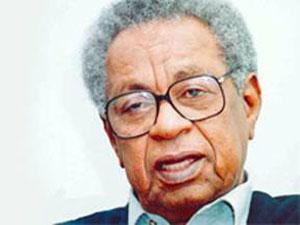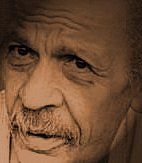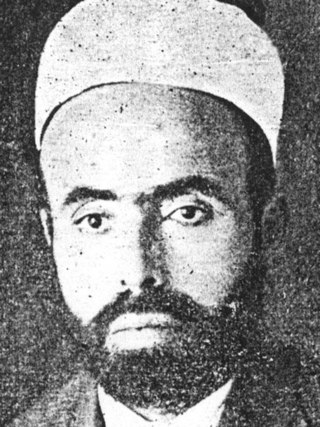
Al Arabiya is an international Arabic news television channel, currently based in Dubai, that is operated by the media conglomerate MBC.

Tayeb Salih was a Sudanese writer, cultural journalist for the BBC Arabic programme as well as for Arabic journals, and a staff member of UNESCO. He is best known for his novel Season of Migration to the North, considered to be one of the most important novels in Arabic literature. His novels and short stories have been translated into English and more than a dozen other languages.
Omar Amiralay was a Syrian documentary film director and civil society activist. He is noted for the political criticism in his films, and played a prominent role in the events of the Damascus Spring of 2000.
Turki al-Hamad is a Saudi Arabian political analyst, journalist, and novelist, best known for his trilogy about the coming-of-age of Hisham al-Abir, a Saudi Arabian teenager, the first installment of which, Adama, was published in 1998. Although banned in Saudi Arabia, Bahrain, and Kuwait, the Arabic edition of the trilogy — called in Arabic Atyaf al-Aziqah al-Mahjurah — has sold 20,000 copies.
Ibrāhīm al-Kōnī is a Libyan writer and is considered to be one of the most prolific Arab novelists.
Banipal is an independent literary magazine dedicated to the promotion of contemporary Arab literature through translations in English. It was founded in London in 1998 by Margaret Obank and Samuel Shimon. The magazine is published three times a year. Since its inception, it has published works and interviews of numerous Arab authors and poets, many of them translated for the first time into English. It is also co-sponsor of the Saif Ghobash–Banipal Prize for Arabic Literary Translation.

Ahmed Fouad Negm, popularly known as el-Fagommi الفاجومي, was an Egyptian vernacular poet. Negm is well known for his work with Egyptian composer Sheikh Imam, as well as his patriotic and revolutionary Egyptian Arabic poetry. Negm has been regarded as "a bit of a folk hero in Egypt."
Muhammad Shahrour was a Syrian philosopher and author. He was an Emeritus Professor of Civil Engineering at the University of Damascus who wrote extensively about Islam. Shahrour was trained as an engineer in Syria, the former Soviet Union and Ireland. He referred to the book of the Islamic prophet Muhammad as "The Book", not the Quran; which casts him in direct contradiction with other Islamic thinkers and traditional scholars. Yet similar to Quraniyoon Muslims, he did not consider Hadith as a divine source; however, he did not belong to the same school as Ahmed Subhy Mansour.

The Shihab dynasty was an Arab family whose members served as the paramount tax farmers and local chiefs of Mount Lebanon from the early 18th to mid-19th century, during Ottoman rule. Their reign began in 1697 after the death of the last Ma'nid chief. The family centralized control over Mount Lebanon, destroying the feudal power of the mostly Druze lords and cultivating the Maronite clergy as an alternative power base of the emirate. The Shihab family allied with Muhammad Ali of Egypt during his occupation of Syria, but was deposed in 1840 when the Egyptians were driven out by an Ottoman-European alliance, leading soon after to the dissolution of the Shihab emirate. Despite losing territorial control, the family remains influential in modern Lebanon, with some members having reached high political office.

Sheikh Ahmed Aref El-Zein was a Shi'a intellectual from the Jabal Amil area of South Lebanon. He was a reformist scholar who engaged in the modernist intellectual debates that resonated across Arab and Muslim societies in the early 20th century. Disappointed by the lack of education and prosperity of his community under Ottoman rule, he collaborated with other local scholars on interaction with reform movements underway in Damascus, Baghdad and Cairo. By founding the monthly magazine Al-Irfan, he is credited with bringing literary edification and news of scientific innovations to his community and others across the Arab-speaking world. He published a weekly paper, Jabal Amil for a year, wrote several books and established the first printing press in South Lebanon. He promoted education for both sexes in his conservative society and helped female authors by publishing their material under their real names or pseudonyms. He was a pillar in the national Syrian-Arab movement against Ottoman rule in the later years of the Sultanate and resisted the French mandate by advocating independence for Lebanon. He sought educational reforms and the reconciliation of Islamic values with Western ideas of liberty and democracy.
Beirut39 is a collaborative project between the Hay Festival, Beirut UNESCO's World Book Capital 2009 celebrations, Banipal magazine and the British Council among others in order to identify 39 of the most promising Arab writers under the age of 39. The project was carried out during 2009-10 and followed on the success of Bogotá39, an earlier contest held in 2007 to identify the most promising young Latin American writers. In connection with Port Harcourt being World Book Capital 2014, Africa39 was launched by Hay Festival, featuring 39 writers under the age of 40 from sub-Saharan Africa.

Rawafed is a flagship Al Arabiya television programme, consisting of half-hour documentary broadcast once a week (Wednesday) on Al Arabiya News Channel. Its host and director is Ahmad Ali El Zein, whose style of smooth questioning brought a huge world audience to the show. Launched in 2003, it was awarded in 2010 the golden prize for the best cultural and educational program at the 10th edition of the Gulf Media Festival.
Zein is a class of prolamine protein found in maize.

The Socialist Arab Lebanon Vanguard Party is a political party in Lebanon. The party was led by Abd al-Majid al-Rafei until his death in July 2017. It is the Lebanese regional branch of the Iraqi-led Ba'ath Party. The party held its second congress in October 2011. Founders of the party included Dr. Abd al-Majid al-Rafei, Jihad George Karam, Rafiq Nasib Alfaqiya, Karam Mohamed Assahli, Hani Mohamed Shoiab, Ammar Mohamed Shabli, Hassan Khalil Gharib and Asaf Habin Alharakat.

Mohamad Zein El Abidine Ali Tahan, known as Mohamad Zein Tahan or simply Zein Tahan, is a Lebanese footballer who plays as a full-back for Lebanese Premier League club Safa, whom he captains, and the Lebanon national team.
Ali Al-Zein is a Lebanese actor and voice actor. He is a cousin of Ahmad Al-Zein.

Salah Al-Din is a 2001 historical Arabic television series directed by Hatem Ali which deals with the political events in the sixth century AH in the region of the Levant and Egypt, in the scene of the Crusades. The series focuses on the biography of Salah ad-Din and highlights his courage and good creation and wisdom as he tells how he managed to unite the Muslims and crush the crusaders in the battle of Hattin and restore Jerusalem after being taken away by the Crusaders for almost a hundred years. The series presents the historical narrative from an Islamic point of view and distanced itself from the thorny areas between Sunnis and Shiites, as it refrains from addressing the Fatimid Ismaili Shiite orientation and the difference between it and the Zengid Sultanate of the Sunni Abbasid Caliphate, whether in faith or practice. The series consists of thirty episodes starting from the birth of the protagonist and continues to display events in chronological order with exposure to other threads complementary to the story and related to the historical period. The series conjuncts with the series Searching for Salah al-Din by Najdat Anzour on the impact of the Al-Aqsa restore, which began in autumn 2000.
Akkar al-Atika is a town and municipality located in the Akkar Governorate in northern Lebanon. It is about 135 kilometres (84 mi) north of Beirut. Akkar al-Atika contains the 11th-century fortress of Gibelacar, which was utilized by the Crusaders and became the headquarters of the Sayfa clan, whose members were chieftains and Ottoman governors of Tripoli and its districts in from the late 16th until the mid-17th centuries.









